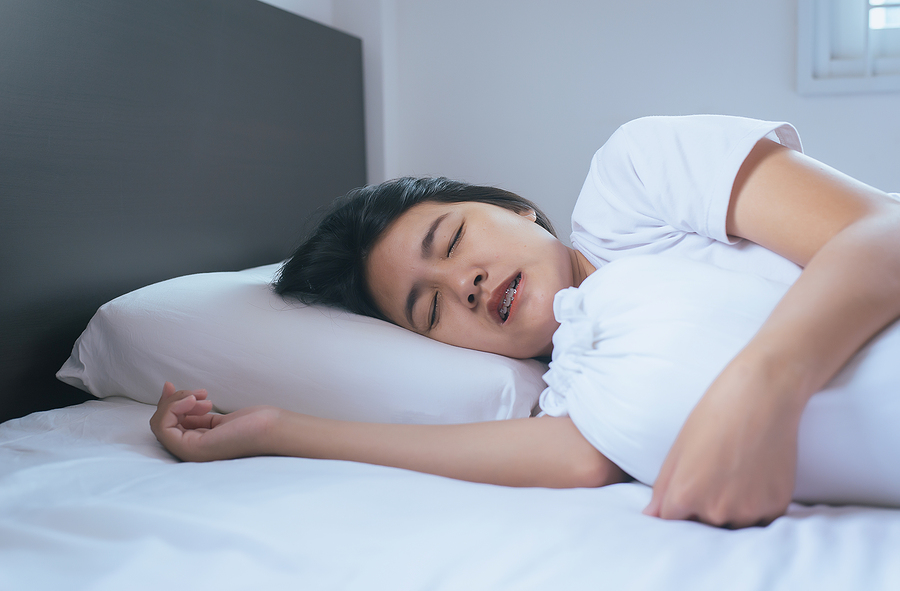It is common for some people to clench and grind their teeth involuntarily in reaction to stress, anger, or fear. This reaction is referred to as bruxism. However, sleep bruxism is another medical condition considered distinct from bruxism but with a similar physical action.
Related Blog: How Do Naps Affect Productivity at Work?
What Is Sleep Bruxism?
Sleep bruxism refers to the involuntary action of grinding your teeth while sleeping. Unlike bruxism that happens when one is awake, sleep bruxism happens when an individual is asleep, thus less likely to know that they are grinding and clenching their teeth. Since the sleeping person does not know their bite strength, they may clench and grind the teeth hard, causing serious problems for the jaw and teeth.
The American Sleep Association reveals that sleep bruxism is slightly more common in children than adults. But even the adults with this condition may not know they have it until physical symptoms begin to show.
Causes of Sleep Bruxism
Sleep bruxism results from a combination of genetic, psychological, and physical factors. The following factors contribute to the risk of developing this condition:
- Age - Sleep bruxism is prevalent in children and often goes away with age.
- Personality Type - Aggressive, hyperactive, or competitive people are at a higher risk of developing sleep bruxism.
- Stress - Anxiety, anger, stress, and frustration can all increase the risk of sleep bruxism.
- Medications and Other Substances - Consuming caffeinated beverages and alcohol, taking antidepressants and smoking tobacco are popular for disrupting sleep patterns, but they can also trigger sleep bruxism.
- History Background of Sleep Bruxism - Sleep bruxism tends to run in families. If an individual has bruxism in a family, other members have a higher chance of developing the condition.
How Sleep Bruxism Affects Sleep
Sleep bruxism can delay REM sleep, thus disrupting your sleep patterns or making you wake up before you enter the deep sleep cycle.
Besides, sleep bruxism rarely exists on its own and could be a sign of other sleep disorders, such as sleep apnea and snoring. Sleep apnea causes breathing to stop for periods during sleep and can be highly dangerous while snoring refers to the rumbling and rattling sound a person produces as air tries to pass through a blocked airway.
Treatments for Sleep Bruxism
Several approaches can help reduce the episodes of sleep bruxism and lower damage to the jaw and teeth; otherwise, no treatment can eliminate or cure the condition fully. The best sleep bruxism management approach varies depending on the individual.
Stress Reduction
Taking steps to reduce stress can help naturally decrease sleep bruxism. Cognitive-behavioral therapy for insomnia is a technique that can help reframe negative thoughts and improve sleep. Getting better sleep can also help relieve stress.
Medications
Medications that alter brain chemicals and reduce muscle activity responsible for teeth grinding can help. Examples of the drugs that show effectiveness in managing sleep bruxism are Botox injections.
Mouthpieces
Night guards are types of mouthpieces that can help reduce sleep bruxism's damage to the mouth and teeth. Mandibular advancement devices (MAD) can also help stabilize the jaw and mouth in a particular position to prevent grinding. They hold the lower jaw forward.
If you experience any effects or symptoms of sleep bruxism and suspect that you could be grinding your teeth while you sleep, you can try the above-mentioned treatment methods to help you relax and have a better sleep. However, getting the rest you need at night requires you to have the right mattress. At Land Of Sleep, we recognize the role a great mattress plays in improving sleep quality. Contact us today for your mattress/bedding needs in Sarasota, Venice, and the regions around.





